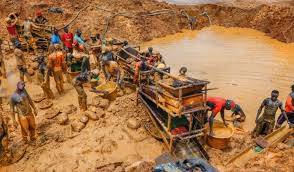"Illegal Mining Devastates 4,700 Hectares of Forest and Water Resources"
Illegal mining has become a significant environmental crisis in Ghana, with vast areas of forest reserves, water bodies, and farmland under threat. In the Ashanti Region, over 4,700 hectares of pristine forest land have been destroyed due to unregulated mining activities. Forest reserves such as Apamprama, Subin Shelterbelt, and Oda River have borne the brunt of this environmental degradation, threatening local ecosystems, livelihoods, and water quality in the region.
The scale of destruction is alarming. Forests, which play a critical role in preserving biodiversity and maintaining climate stability, have been uprooted. The Apamprama, Subin Shelterbelt, and Oda River forests, once dense and ecologically rich, have now become scarred landscapes. The loss of these forested areas directly impacts wildlife habitats, making survival increasingly challenging for species dependent on these ecosystems. This deforestation also reduces the forests' ability to absorb carbon dioxide, further exacerbating climate change.
Water bodies in the affected regions have also suffered immensely. Rivers and streams that once provided clean water for communities are now heavily polluted with chemicals such as mercury and cyanide, used in illegal mining processes. These toxic substances are not only dangerous to aquatic life but also pose severe health risks to humans relying on these water sources for drinking, cooking, and farming. In areas where mining residues flow into rivers, residents are forced to seek alternative water sources or risk exposure to harmful pollutants.
Farmland is another casualty of illegal mining. In a region where agriculture forms the backbone of many communities, the contamination of soil and water disrupts food production and income. Farmers are finding it harder to grow crops on contaminated soil, which affects food supply and drives up prices, impacting food security and livelihoods across the area.
Despite government efforts to curb illegal mining through enforcement and community education, the issue remains widespread. Tackling this environmental challenge requires stricter enforcement of mining laws, increased community involvement, and sustainable economic alternatives for communities reliant on mining. Additionally, reforestation efforts and cleanup projects are essential to restore damaged ecosystems and support those affected by this crisis.
Without urgent action, the ongoing illegal mining activities will continue to devastate Ghana's forests, water bodies, and farmlands, threatening both the environment and the communities that depend on it.



No comments yet
Be the first to share your thoughts!